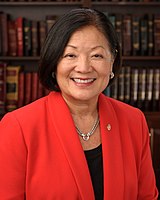Democratic Party of Hawaii
The Democratic Party of Hawaiʻi (Hawaiian: ʻAoʻao Kemokalaka o Hawaiʻi) is the affiliate of the Democratic Party in the state of Hawaii.
Democratic Party of Hawaiʻi ʻAoʻao Demokalaka o Hawaiʻi
Derek Turbin
April 30, 1900
It is currently the dominant party in the state, and is one of the strongest affiliates of the national Democratic Party. The party currently controls both of Hawaii's U.S. House seats, both U.S. Senate seats, the governorship, and has supermajorities in both houses of the state legislature. In particular, the party controls all but two of the 25 seats in the state Senate.
Organization[edit]
The party is a centralized organization established to promote the party platform as drafted in convention biennially. It is also charged with registering voters and delivering voter turnout through county organizations for Hawaii County, Kauaʻi County, Maui County and the City and County of Honolulu.
A major factor in the party's organization is the ethnicity of Hawaii itself. As Democrats emerged as the dominant political party in 1962, they sought to garner support from Native Hawaiians and other non-whites. This success is attributed to the efforts of portraying themselves as not belonging to the power elite. For decades, the party had little difficulty in winning local and statewide elections, with a significant number of Democrats running unopposed in certain years.[1] The party has also established a gender-equality policy that required the election of more women to the state central committee, resulting in an equal balance of men and women in administrative positions.[2]
State-level organizational meetings are held at the precinct, district, county, and state level, biennially, during even-numbered years. The party adheres to a complex set of bylaws that addresses eligibility for membership, election of officers, holding conventions, and recruiting delegates to represent the party at conventions.[3] A minimum of two delegates are required from each precinct, with an equal number of men and women, as required by its gender-equality policy.[3] While there is no permanent location for state conventions, nearly all of them have been held on the island of Oahu (the most populated) since 1960.[4]
The party is governed by a Chair and the State Central Committee. That committee is composed of representatives from each senatorial district, as well as representatives from each county, for each caucuses and the Young Democrats of Hawaii. Gender equality policies require the State Central Committee to be split equally between male and female representatives.[5]
Due to the extreme geographical distance from the headquarters of the Democratic National Committee in Washington D.C., the party is relatively independent in its affairs. As a result, the national party does not typically inquire contributions for fund-raising purposes. Due to the party's dominant status in the state, there is some over-representation at national party conventions, in comparison to the population of Hawaii itself. Despite certain advantages, the party remains somewhat isolated on the national level.[6]
Political positions[edit]
Liberalism[edit]
The Democratic Party has tended to hold a position on social issues based on how an issue would affects bystanders and/or the environment. The party's platform is based on the values of liberty and social justice, with compassion and respect towards the individual.[12] In 1997, the reciprocal beneficiary registration gave recognition to same-sex couples.[12] In 1970 Democratic Governor John A. Burns legalized abortion in Hawaii. But this position has also led to restrictions.[13] In 2006 strict smoking bans were put in place based on the effects of secondhand smoke on bystanders.[14] Since the Revolution of 1954, the Democratic Party of Hawaii has been considered progressive in its center-left ideologies. The party has promoted racial tolerance, multiculturalism, and protection of minorities.
Trade unionism[edit]
The Democratic Party has asserted itself as Hawaii's labor party since gaining support from unions and plantation workers in the 1950s. The party has supported workers rights and collective bargaining. Opposition has come from employers and small business owners who feel their rights have been neglected because of the emphasis on employee protection and rights.
Economics[edit]
The Democrats prefer increased regulation of big companies because of the relatively small marketplace in Hawaii and past experiences with monopolies and oligopolies, such as the Big Five employer monopoly on the job market. The shipping and airline industries in particular are targeted for regulation. The Democrats tend to be closely involved with the tourism industry. The party believes in the simplification of government processes on the local and state level, with integration of databases to promote efficiency in these areas.[12]
Environment[edit]
The Democratic Party has favored conservation efforts such as wildlife sanctuaries and reserves. Pollution reduction initiatives have received bipartisan support in Hawaii. The reduction of one's carbon footprint is reflected in the party's encouragement of using clean energy sources, also with environmentally friendly modes of transportation.[12]
Healthcare[edit]
The party platform supports a public health care system with development long-term financing solutions for individual care. The party has expressed support towards single payer universal health care coverage with the inclusion of a public option in this plan. The party does not support the denial of coverage towards women for abortion services.[12] Democrats have been involved with healthcare issues and supportive of non-profit healthcare providers. They are also responsible for the Hawaii Prepaid Health Care Act.
Religion[edit]
Religion in the Democratic Party varies among individuals. Governor John A. Burns, a devout Roman Catholic, allowed Hawaii to become the first state to legalize abortion. He put his religious views aside when he decided not to veto the bill.[13]

